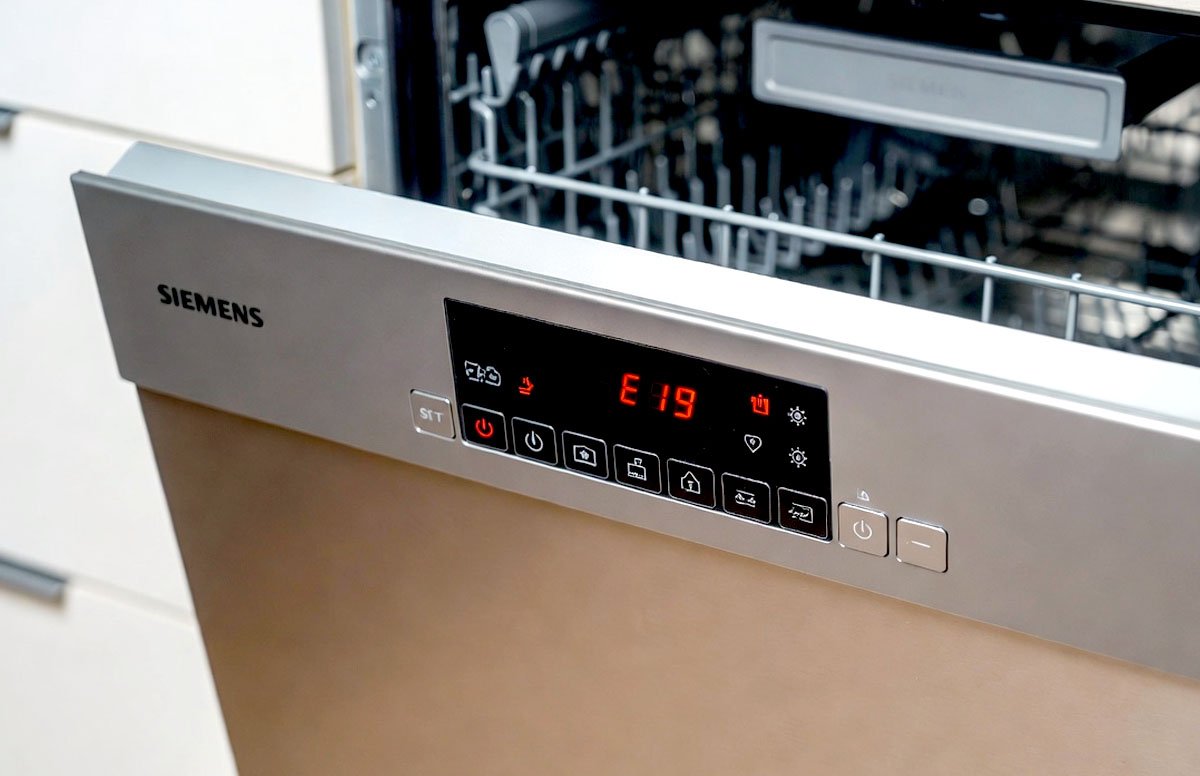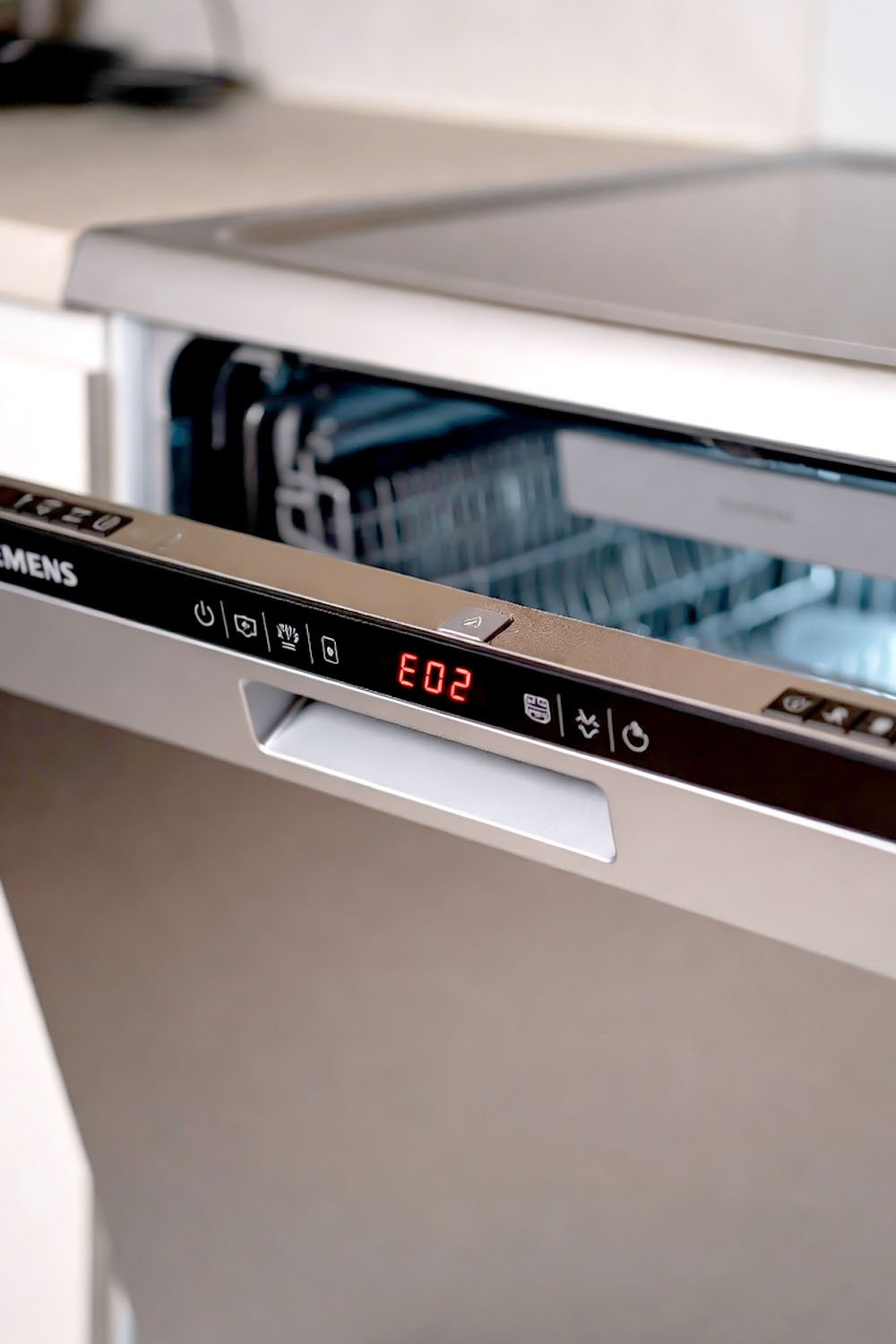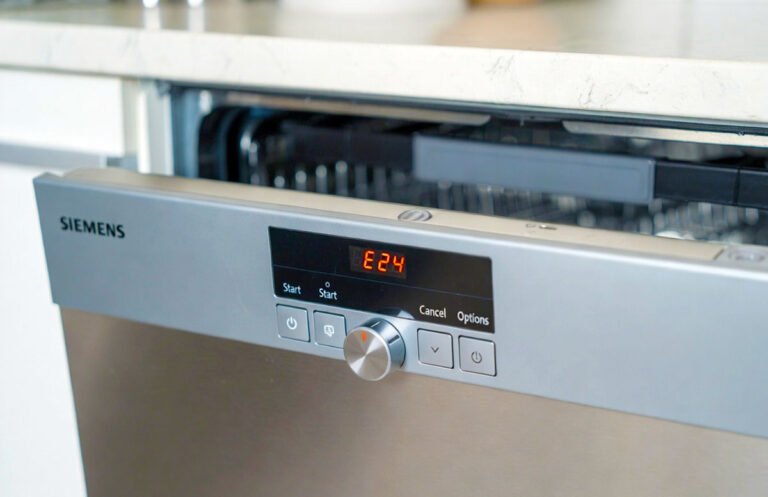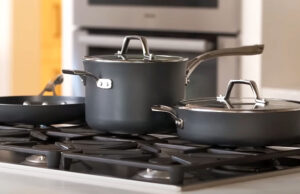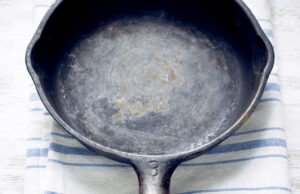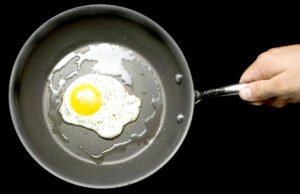As an Amazon Associate, I earn from qualifying purchases at no extra cost to you.
Should You Rinse Dishes Before Putting Them in the Dishwasher?
You open your dishwasher, ready to load your dirty dishes, and suddenly ask yourself, ‘Should I rinse these first?’ You are not alone. Many people think they need to wash dishes before using a dishwasher. The truth is, you don’t need to rinse dishes before putting them in the dishwasher. Modern dishwashers are made to handle food bits. In this article, you will learn everything about rinsing or not rinsing dishes, what really matters, and how to get the best clean with less work.
Understanding How a Dishwasher Really Works
A lot of people think dishwashers are just small machines that spray water. But modern dishwashers are smarter and stronger than that. They have strong water jets, smart sensors, and hot water cycles that help remove food, grease, and stains. Some even come with food grinders or filters that catch leftover food bits.
Inside a dishwasher, hot water sprays from the spinning arms. The water has detergent mixed in, which helps break down grease and food particles. Then, the water drains, and more clean water sprays again. This happens a few times in different cycles. After all that, the dishwasher dries the dishes using heat or air.
Some dishwashers also come with sensors. These sensors check how dirty the water is. If the water looks too dirty, the dishwasher will keep running until your dishes are clean. That means, even if there is food on your dishes, the machine will work harder to clean them.
But here’s the truth: when you rinse your dishes before putting them in the dishwasher, the sensors may not see any dirt. This can cause the dishwasher to run a shorter cycle, thinking the dishes are already clean. The result? Not-so-clean dishes.
Another thing to know is about detergent. Dishwasher soap is made to stick to food bits. If there’s no food on your plates, the detergent might just slide off and not clean well. That means rinsing first could actually lead to worse results.
Also, dishwashers save water compared to hand washing. If you rinse your dishes before placing them in the machine, you waste more water. That means higher bills and more harm to the planet.
Here’s what you should do instead: scrape off big food chunks into the trash. Do not rinse. Just load the dishes as they are. Let the machine do the cleaning. If something is very sticky, like melted cheese or dried-on rice, then yes, maybe give it a quick soak or light rinse. But for most dishes, scraping is enough.
The bottom line is, dishwashers are made to clean. Let them do their job.
- Dishwashers use strong hot water and detergent to clean dishes
- Most have sensors that adjust the cycle based on dirt level
- Rinsing before loading can confuse the dishwasher and clean less
- Scrape food chunks, but don’t rinse dishes completely
- You save time, water, and energy by skipping the rinse
Why Rinsing May Actually Do More Harm Than Good
At first, rinsing dishes might sound helpful. You may think, ‘If I rinse, the dishwasher will have less work to do.’ But that’s not how it really works. In fact, rinsing can actually make things worse.
Let’s talk about how. First, if you rinse your plates and cups until they look clean, the dishwasher thinks there’s nothing to clean. Many machines use sensors to check the dirtiness of the water. So if there’s little food left, the dishwasher will shorten the cycle or use less power. That means it won’t wash as well. The result is dishes that still feel greasy or have cloudy spots.
Also, modern dish soaps are designed to work with food. That’s right. The detergent needs something to hold on to. If the plates are too clean, the soap can’t do its job. It may just slide off the surface and go down the drain. That’s like pouring your soap down the sink!
Another problem is water waste. Rinsing each dish before putting it in the dishwasher can use up to 20 gallons of water. That’s a lot, especially when you think the dishwasher only uses around 4 to 6 gallons for a whole load. You’re using extra water for nothing.
And think about your time. You may spend 10 to 15 minutes rinsing everything. That’s time you could use for something else—like relaxing or spending time with family. Why do more work when your machine is built to do it?
Also, too much rinsing can even damage your plates. Over time, constant rubbing or rinsing under strong water can wear down the shine on your dishes, especially glassware.
One more reason: bacteria. If you rinse and then let dishes sit before running the dishwasher, you could leave them damp. Damp places are a perfect home for germs to grow. Scraped but unwashed plates dry faster and grow fewer germs.
So, to get the best results, just scrape off large food, load the dishes, and run the machine. It’s simple, clean, and smart.
- Rinsing tricks dishwasher sensors into thinking dishes are clean
- Soap works better when there’s some food on the plate
- Rinsing wastes water and takes extra time
- Over-rinsing can make glassware lose its shine
- Damp rinsed plates may grow bacteria faster
What You Should Do Instead of Rinsing
If rinsing is not good, what should you do instead? The answer is simple: just scrape and load. That’s it.
Before putting dishes in the dishwasher, scrape off any big food bits. Use a fork, spoon, or even a paper towel if needed. This helps keep your dishwasher clean and prevents clogs in the drain or filter.
If something is super sticky, like peanut butter or egg yolk, you can give it a quick swipe with a wet sponge, but do not rinse the whole dish under water. Just loosen the stickiness a bit and place it in the dishwasher.
Here’s how to load your dishes the right way:
- Plates should go in the bottom rack
- Cups and glasses go in the top rack
- Utensils go in the basket, mixed up to avoid sticking together
- Keep space between dishes so water can reach all areas
- Do not block the spray arms or detergent container
Also, try not to overload the dishwasher. If dishes are stacked too tight, water can’t get to every surface. That means they won’t get clean, even if they were rinsed before.
Remember to check and clean the dishwasher filter every few weeks. It collects food bits and keeps your machine running smoothly. A clean filter means cleaner dishes.
Use good-quality dishwasher detergent. Some types come with a rinse aid, which helps prevent water spots and keeps glasses shiny. Always follow the amount suggested on the package. Too much soap can leave a film. Too little may not clean enough.
Finally, run the dishwasher when it’s full. This saves water, energy, and money. But don’t wait too long—if you take days to fill it up, leftover food can dry and stick hard. If that happens, give dishes a fast soak in the sink with just water, no soap.
- Scrape big food chunks instead of rinsing
- Load dishes in the right place for best cleaning
- Do not overcrowd the racks
- Keep spray arms clear and filters clean
- Use good detergent and run full loads only
When Rinsing Might Be Okay in Special Cases
There are a few times when rinsing could be helpful, but only in special cases. One example is if you are not going to run the dishwasher right away. Maybe you only have a few dirty plates and want to wait until the machine is full. In this case, a quick rinse with water (no soap) can help stop bad smells or food from drying too hard.
Another time is if the food is really sticky, like dried cheese, oatmeal, or egg. These types of food dry fast and get super hard. In that case, a gentle rinse or soak can make the dishwasher’s job easier. But even then, only do a light rinse. Don’t scrub or make the dish spotless.
If you are dealing with burnt food or very oily pots and pans, sometimes it’s okay to rinse a little or wipe with a paper towel first. This helps prevent too much grease from entering the dishwasher and clogging it.
Also, if your dishwasher is very old or doesn’t clean well, then yes, some rinsing might help. Not all dishwashers are the same. Some older models just don’t have strong water pressure or heat. In that case, rinsing might help avoid running the same load twice.
Another special time is when you are washing fragile dishes or things with labels. In these cases, a light rinse and gentle cleaning might be safer before putting them in the dishwasher.
But even in these situations, always try to scrape first. Only rinse if you have a good reason. Rinsing every dish all the time is not needed and causes more work for you.
- Rinse if you won’t run dishwasher soon
- Sticky foods like egg or cheese may need light rinse
- Burnt or greasy pots can be wiped or lightly rinsed
- Older dishwashers might need a bit more help
- Fragile items might need a soft pre-rinse
Common Myths About Rinsing Dishes Before the Dishwasher
Many people believe things about dishwashers that are not true. These common myths can lead to wasted time, more work, and even worse cleaning. Let’s look at the biggest ones.
Myth 1: Dishes must be spotless before going into the dishwasher.
No, they don’t. Dishwashers are made to clean dirty dishes. If you wash them clean before loading, you’re just doing double work.
Myth 2: Rinsing helps the dishwasher clean better.
This is not true. Detergent needs food particles to stick to. Rinsing first can stop the soap from doing its job.
Myth 3: Rinsing prevents smells.
Not really. Bad smells come from leftover food sitting too long. Just scrape and run the machine daily or use a rinse cycle if waiting.
Myth 4: Dishwashers can’t clean dried food.
Modern dishwashers can clean dried food easily. Just scrape the plate and let the machine do the hard work.
Myth 5: You save water by rinsing.
Wrong again. Rinsing by hand uses much more water than just letting the dishwasher clean it all.
Myth 6: All dishwashers are the same.
That’s not true. Older dishwashers may not be as strong, but most newer models are powerful enough without pre-rinsing.
Myth 7: Rinsing keeps the dishwasher clean.
The truth is, regular filter cleaning and running the machine often is what keeps it clean. Rinsing doesn’t help that much.
- Dishes do not need to be spotless before loading
- Soap works better when some food is left
- Smells come from sitting food, not skipping rinse
- Dishwashers can clean dried food just fine
- Rinsing uses more water, not less
- Newer machines clean better than old ones
- Dishwasher cleanliness comes from care, not rinsing
Saving Time, Water, and Energy the Smart Way
One of the best things about skipping rinsing is the time you save. Rinsing every dish before loading can take 10 minutes or more. That’s time you could use to rest, enjoy family time, or finish other tasks.
Also, when you skip rinsing, you save water. A running tap can use up to 2 gallons of water per minute. If you rinse for just 10 minutes, you waste about 20 gallons! A whole dishwasher load uses much less.
Energy is saved too. Hot water from your tap uses energy to heat. If you stop rinsing, you save money on both your water and power bills.
And when you let the dishwasher do the work, you protect your hands. Washing and rinsing dishes by hand every day can dry out your skin, hurt your back, or make you tired.
Using a dishwasher the right way also makes it last longer. If you rinse too much, food won’t reach the filter. Over time, that can lead to mold, smells, or filter damage.
Try this simple routine: scrape food into the trash or compost, place the dish in the machine, run a full load, clean the filter once a week. That’s it.
Doing it this way is good for your time, money, health, and the Earth.
- Skipping rinse saves you time every day
- Tap water rinsing wastes many gallons
- You save on energy by skipping hot water
- Less rinsing protects your hands and health
- Dishwashers work better and last longer with smart use
Final Thoughts
In the end, rinsing dishes before the dishwasher is not needed for most people. Modern dishwashers are strong and smart enough to clean dirty plates with just a scrape. Rinsing wastes your time, water, and energy. Only rinse in rare cases like dried egg or sticky cheese. By trusting your machine and loading it right, you’ll save time and get cleaner dishes. Remember, less rinsing means smarter cleaning.
Frequently Asked Questions (FAQs)
Is it okay to put dirty dishes straight into the dishwasher?
Yes, it is perfectly okay to put dirty dishes straight into the dishwasher. Dishwashers are made to clean off food, grease, and mess. Just scrape off large pieces like bones or pasta into the trash, and place the dishes in the machine. The hot water and strong spray do the rest. You don’t need to scrub or rinse. In fact, doing too much before can confuse the machine and give you poor cleaning results.
Can rinsing dishes before loading cause problems?
Yes, rinsing dishes before loading can actually cause problems. Most dishwashers have sensors that check for food particles. If your plates are too clean, the machine might not run a full wash cycle. This means your dishes could come out still dirty. Also, rinsing wastes water and takes extra time. It can even lead to spots or film on glasses if detergent doesn’t have food to work on.
Do I need to rinse dishes if food is dried on?
Not always. Most modern dishwashers are built to handle dried-on food. But if something is very sticky or hard like cheese or oatmeal, a quick soak in water (not a rinse under the tap) can help. Letting the dish sit with a little water can loosen the dried food. Then just place it in the dishwasher. No need to scrub or fully rinse.
Is it true that soap works better when dishes are not rinsed?
Yes, it is true. Dishwasher soap is made to attach to food particles. If your plates are too clean, the soap may not work well. It can just slide off the smooth dish and not clean properly. Leaving some food on the plate helps the soap do its job. So, skipping the rinse actually gives you better cleaning.
Can rinsing make my dishwasher smell better?
Not really. Smells in the dishwasher come from old food stuck in the filter or sitting on dishes too long. Instead of rinsing, scrape the food and run the dishwasher daily or use a short rinse cycle. Clean the filter every week and leave the door open a bit to air it out. These steps help much more than rinsing before loading.
Do I need to rinse glassware to avoid spots?
No, you don’t need to rinse glassware to avoid spots. Spots come from hard water or too little rinse aid. Make sure your dishwasher has rinse aid filled and use a detergent that’s good for hard water. Also, don’t overload the dishwasher. Letting the water reach every glass will help them shine. Rinsing before washing does not help and may even cause more spotting.
Can skipping rinse save on my water and energy bills?
Yes, skipping the rinse can save both water and energy. Every time you rinse dishes under running water, you waste several gallons. That water also needs to be heated, which uses power. Just scraping your plates and placing them in the dishwasher uses far less water and electricity. Over time, this can lower your monthly bills and help the environment too.
Do I need to rinse if I use eco or quick wash cycles?
Not really. Even in eco or quick wash cycles, your dishwasher is designed to handle food. These cycles use less water and time, but they still clean well if dishes are loaded right. Just make sure to scrape off food and don’t overload the machine. If food is too hard or dry, you can soak it first, but no need to rinse fully.

